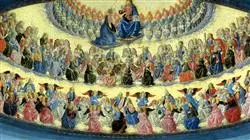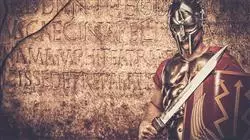University certificate
The world's largest faculty of humanities”
Introduction to the Program
The inception of one of the most significant developments in history, with the scrutiny of an extremely rigorous theological vision”

In order to be considered competent in this field of knowledge, one must conduct an in-depth study of the formal theological principles involved in the theological reading of Sacred Scripture: canonicity, inspiration and inerrancy, as well as the main historical and geographical elements that aid in the study of the Bible.
Students will thus recognize the fact of divine revelation, will be able to describe the historical, cultural and religious framework in which the divine revelatory action took place, and show how the Holy Scripture presents the history of humanity in a linear sense and not as a cyclical process.
It consists of a learning journey that will culminate in an approach to Christian life in the first centuries of the Church, from the vestiges that, from the plastic manifestations of their beliefs, rites and customs, have come down to us; and ultimately, in a body of knowledge of the culture of their time, according to the rites and funerary monuments, places of worship and iconic expressions of Christian faith. All this in a 100% online program that includes audiovisual material and complementary readings designed by specialists in the field.
Explore the The Origins of Christianity from a contextual perspective: A reasoned view on the characteristics of the current situation”
This Postgraduate certificate in The Origins of Christianity contains the most complete and up-to-date program on the market. The most important features include:
- Practical cases that apply the theoretical content through real life situations
- The graphic, schematic, and eminently practical content with which they are conceived
- The great variety of practical exercises where the self-assessment process can be carried out to improve learning
- An algorithm-based interactive learning system that enables decision-making in the situations presented
- Its intensive focus on practical learning
- High-quality theoretical lessons, with questions to the expert, discussion forums on controversial topics and individual reflection work
- Content that is accessible from any fixed or portable device with an Internet connection
The greatest University in the technological era is placed at the service of the current needs of society, at a global level, and of the individual, in particular, with a transforming spirit and vocation for social change”
The program’s teaching staff includes professionals in the sector who contribute their work experience to this training program, as well as renowned specialists from leading societies and prestigious universities.
The multimedia content, developed with the latest educational technology, will provide the professional with situated and contextual learning, i.e., a simulated environment that will provide immersive specialization programmed to learn in real situations.
This program is designed around Problem-Based Learning, whereby the professional must try to solve the different professional practice situations that arise throughout the program. For this purpose, the student will be assisted by an innovative interactive video system created by renowned and experienced experts.
The main events of The Origins of Christianity, explained in an intensive and focused Postgraduate certificate"

The most technologically developed university in the area of e-learning, offers you the technical and human solvency of the largest Spanish-speaking, 100% online university in the world"
Why study at TECH?
TECH is the world’s largest online university. With an impressive catalog of more than 14,000 university programs available in 11 languages, it is positioned as a leader in employability, with a 99% job placement rate. In addition, it relies on an enormous faculty of more than 6,000 professors of the highest international renown.

Study at the world's largest online university and guarantee your professional success. The future starts at TECH”
The world’s best online university according to FORBES
The prestigious Forbes magazine, specialized in business and finance, has highlighted TECH as “the world's best online university” This is what they have recently stated in an article in their digital edition in which they echo the success story of this institution, “thanks to the academic offer it provides, the selection of its teaching staff, and an innovative learning method aimed at educating the professionals of the future”
A revolutionary study method, a cutting-edge faculty and a practical focus: the key to TECH's success.
The most complete study plans on the university scene
TECH offers the most complete study plans on the university scene, with syllabuses that cover fundamental concepts and, at the same time, the main scientific advances in their specific scientific areas. In addition, these programs are continuously being updated to guarantee students the academic vanguard and the most in-demand professional skills. In this way, the university's qualifications provide its graduates with a significant advantage to propel their careers to success.
TECH offers the most comprehensive and intensive study plans on the current university scene.
A world-class teaching staff
TECH's teaching staff is made up of more than 6,000 professors with the highest international recognition. Professors, researchers and top executives of multinational companies, including Isaiah Covington, performance coach of the Boston Celtics; Magda Romanska, principal investigator at Harvard MetaLAB; Ignacio Wistumba, chairman of the department of translational molecular pathology at MD Anderson Cancer Center; and D.W. Pine, creative director of TIME magazine, among others.
Internationally renowned experts, specialized in different branches of Health, Technology, Communication and Business, form part of the TECH faculty.
A unique learning method
TECH is the first university to use Relearning in all its programs. It is the best online learning methodology, accredited with international teaching quality certifications, provided by prestigious educational agencies. In addition, this disruptive educational model is complemented with the “Case Method”, thereby setting up a unique online teaching strategy. Innovative teaching resources are also implemented, including detailed videos, infographics and interactive summaries.
TECH combines Relearning and the Case Method in all its university programs to guarantee excellent theoretical and practical learning, studying whenever and wherever you want.
The world's largest online university
TECH is the world’s largest online university. We are the largest educational institution, with the best and widest online educational catalog, one hundred percent online and covering the vast majority of areas of knowledge. We offer a large selection of our own degrees and accredited online undergraduate and postgraduate degrees. In total, more than 14,000 university degrees, in eleven different languages, make us the largest educational largest in the world.
TECH has the world's most extensive catalog of academic and official programs, available in more than 11 languages.
Google Premier Partner
The American technology giant has awarded TECH the Google Google Premier Partner badge. This award, which is only available to 3% of the world's companies, highlights the efficient, flexible and tailored experience that this university provides to students. The recognition as a Google Premier Partner not only accredits the maximum rigor, performance and investment in TECH's digital infrastructures, but also places this university as one of the world's leading technology companies.
Google has positioned TECH in the top 3% of the world's most important technology companies by awarding it its Google Premier Partner badge.
The official online university of the NBA
TECH is the official online university of the NBA. Thanks to our agreement with the biggest league in basketball, we offer our students exclusive university programs, as well as a wide variety of educational resources focused on the business of the league and other areas of the sports industry. Each program is made up of a uniquely designed syllabus and features exceptional guest hosts: professionals with a distinguished sports background who will offer their expertise on the most relevant topics.
TECH has been selected by the NBA, the world's top basketball league, as its official online university.
The top-rated university by its students
Students have positioned TECH as the world's top-rated university on the main review websites, with a highest rating of 4.9 out of 5, obtained from more than 1,000 reviews. These results consolidate TECH as the benchmark university institution at an international level, reflecting the excellence and positive impact of its educational model.” reflecting the excellence and positive impact of its educational model.”
TECH is the world’s top-rated university by its students.
Leaders in employability
TECH has managed to become the leading university in employability. 99% of its students obtain jobs in the academic field they have studied, within one year of completing any of the university's programs. A similar number achieve immediate career enhancement. All this thanks to a study methodology that bases its effectiveness on the acquisition of practical skills, which are absolutely necessary for professional development.
99% of TECH graduates find a job within a year of completing their studies.
Postgraduate Certificate in Origins of Christianity
.
Christianity, one of the most widespread and significant religions in the world today, has its roots in the origins of the first century. It emerged in a complex historical and cultural context, and its development and spread have had a profound impact on Western history and society. The origins of Christianity can be traced back to Jesus of Nazareth, a Jewish preacher who taught principles of love, forgiveness and redemption. His teachings and actions attracted devoted followers, known as disciples, who became the pillars of the new faith. Want to learn even more about this field? Then the Postgraduate Certificate in Origins of Christianity created by TECH Global University is the ideal program for you. The postgraduate course is completely virtual and brings together the most sophisticated learning techniques, with a select curriculum that addresses in various modules everything you need to know about the origins of Christianity. Our study plan makes use of state-of-the-art graphic, audiovisual and interactive material, which you will have within reach of any device connected to the Internet. The curriculum will take you through the historical events, key figures and ideas that shaped one of the world's most influential religions.
Learn about the origins of Christianity
.
The interdisciplinary approach of this program combines history, theology and archaeology to give you a comprehensive overview of the origins of Christianity. Throughout the curriculum, you will explore the historical background of Christianity, from its connection to Judaism, to its spread in the Roman Empire. You will learn about the early followers of Jesus, their revolutionary message and the challenges they faced in a world dominated by Roman power. Likewise, you will analyze historical and archaeological sources to better understand the life and times of Jesus, as well as the different Christian movements and communities that emerged after his death. Finally, you will approach the various theological currents that emerged in the first centuries of Christianity and how they shaped the doctrine and organization of the early church. All this, without having to leave home, with the best teaching tutorials and interactive material that will give that rewarding plus to your professional profile.







